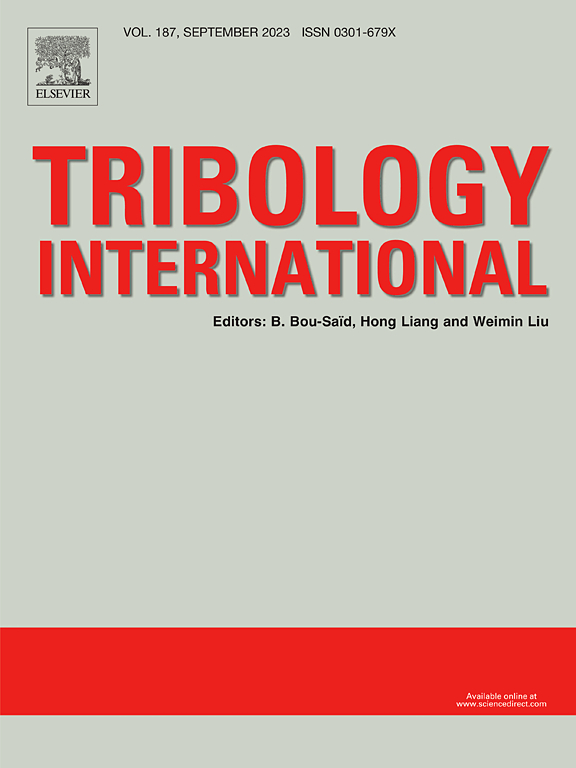通过退火增强 3D 打印聚醚醚酮的层间附着力并调节其摩擦学行为
IF 6.1
1区 工程技术
Q1 ENGINEERING, MECHANICAL
引用次数: 0
摘要
目前大多数通过熔融沉积成型(FDM)打印技术制造的聚醚醚酮(PEEK)部件都存在层间附着力弱、机械强度低的问题。在此,我们采用一种简化的方法,将 FDM 打印与退火后处理相结合,实现了 3D 打印 PEEK 更好的机械强度、层间附着力和耐磨性。在 190 ℃ 下退火的 PEEK 冻裂表面致密。在正常载荷为 30 N 时,退火 PEEK 的磨损率达到最小值 2.83 × 10-5 mm3/(N-m),降低了 34%。在 70 N 的较高负载下,170 ℃ 退火的 PEEK 仍能保持较低的磨损率。此外,退火后的 PEEK 还表现出极佳的制造精度和保真度。在 170 ℃ 下退火的 PEEK 被用来模拟膝关节腔内的磨损,并打印出行星齿轮进行演示,这些齿轮在不同的工作条件下都能稳定运行。这些发现凸显了三维打印 PEEK 结合退火后处理技术在重载齿轮和仿生关节应用中的巨大潜力。本文章由计算机程序翻译,如有差异,请以英文原文为准。
Enhanced interlayer adhesion and regulated tribological behaviors of 3D printed poly(ether ether ketone) by annealing
Most of the current poly(ether ether ketone) (PEEK) parts manufactured via fused deposition modeling (FDM) printing are suffering for weak interlayer adhesion and low mechanical strength. Herein, a simplified tactic is adopted, which combined FDM printing with annealing post-treatment, to realize a better mechanical strength, interlayer adhesion and wear resistance of 3D printed PEEK. The freeze-fracture surface of PEEK annealed at 190 ℃ was dense. At the normal load of 30 N, the wear rate of annealed PEEK reached the minimum value of 2.83 × 10−5 mm3/(N·m), with a 34 % reduction. At a higher load of 70 N, the annealed PEEK at 170 ℃ still maintained a low wear rate. Moreover, the annealed PEEK exhibited excellent manufacturing precision and fidelity. The PEEK annealed at 170 ℃ was used to simulate wear within knee-joint cavity and planetary gears were printed for demonstration, which run stably at different working conditions. These findings highlight the significant potential of 3D printed PEEK combined with annealing post-treatment in the applications of heavy-load gear and bionic joint.
求助全文
通过发布文献求助,成功后即可免费获取论文全文。
去求助
来源期刊

Tribology International
工程技术-工程:机械
CiteScore
10.10
自引率
16.10%
发文量
627
审稿时长
35 days
期刊介绍:
Tribology is the science of rubbing surfaces and contributes to every facet of our everyday life, from live cell friction to engine lubrication and seismology. As such tribology is truly multidisciplinary and this extraordinary breadth of scientific interest is reflected in the scope of Tribology International.
Tribology International seeks to publish original research papers of the highest scientific quality to provide an archival resource for scientists from all backgrounds. Written contributions are invited reporting experimental and modelling studies both in established areas of tribology and emerging fields. Scientific topics include the physics or chemistry of tribo-surfaces, bio-tribology, surface engineering and materials, contact mechanics, nano-tribology, lubricants and hydrodynamic lubrication.
 求助内容:
求助内容: 应助结果提醒方式:
应助结果提醒方式:


